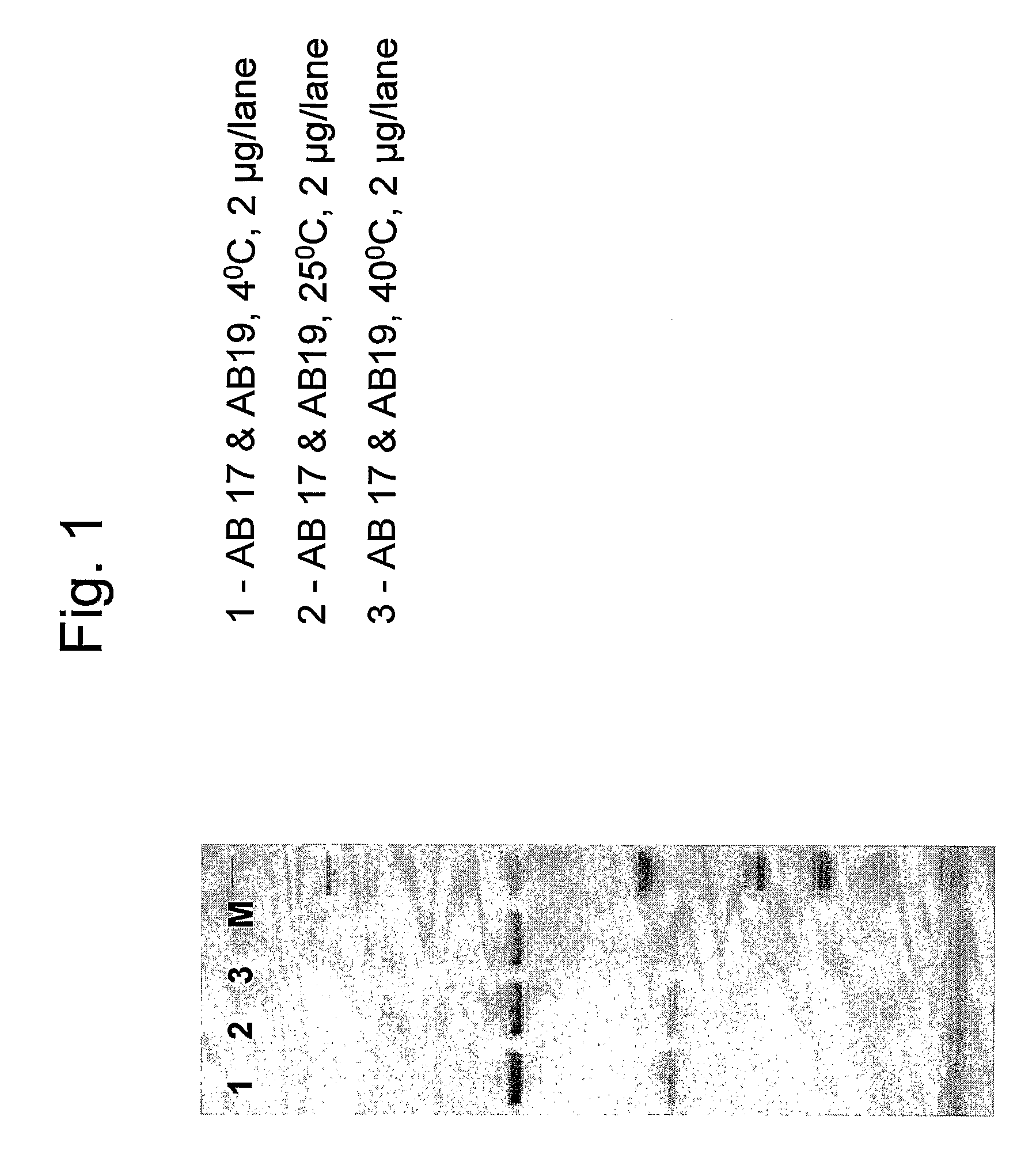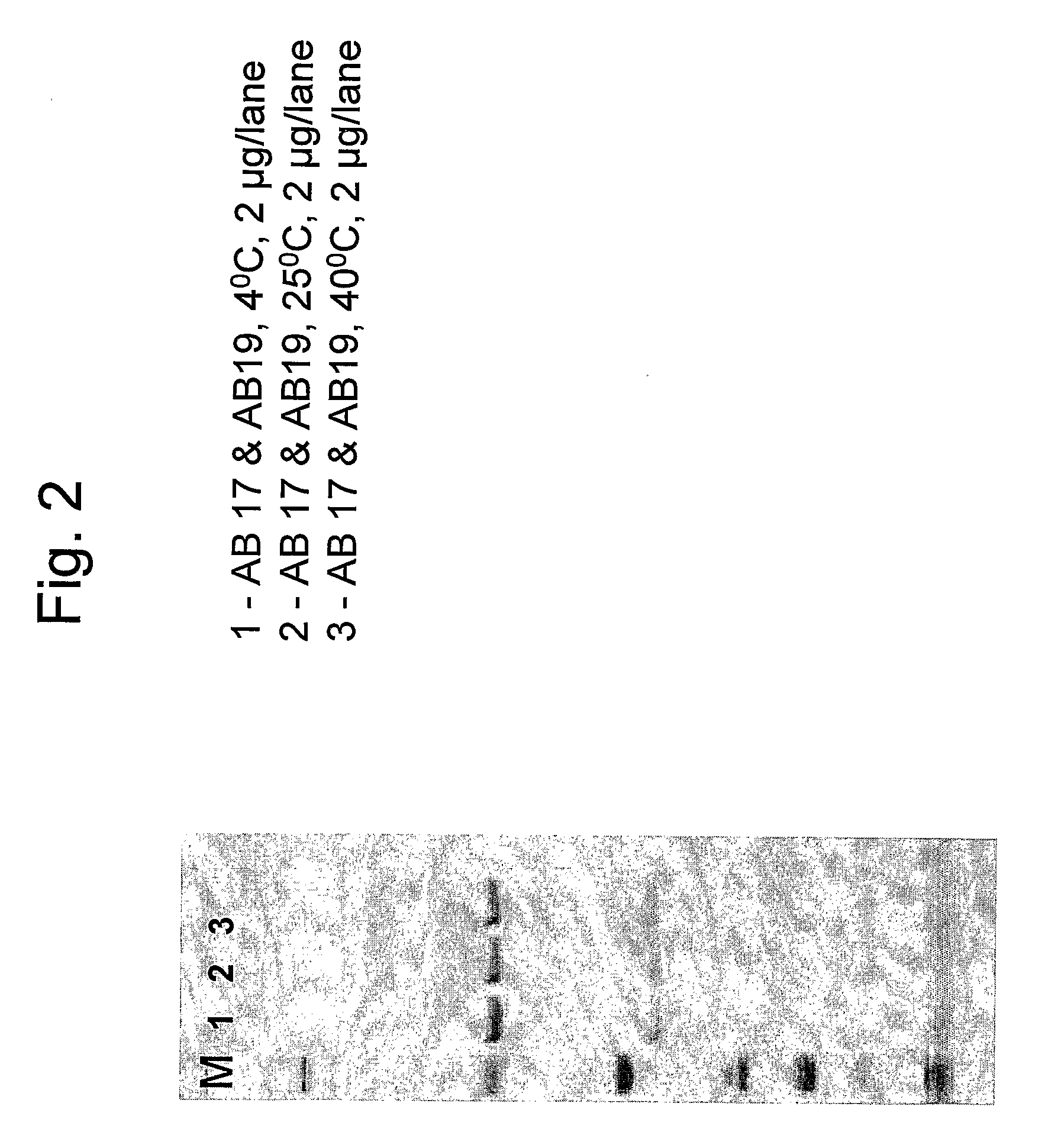Stabilized Anti-Hepatitis B (Hbv) Antibody Formulations
a technology of anti-hepatitis b and formulation, which is applied in the field of liquid formulation of anti-hbsag human monoclonal antibodies, can solve the problems of deteriorating liver function, no treatment for chronic hbv infections in all patients, and patients at high risk of hbv-reinfection of their transplanted liver, etc., to facilitate the administration of antibodies, prevent, treat, manage and/or improve an hbv infection
- Summary
- Abstract
- Description
- Claims
- Application Information
AI Technical Summary
Benefits of technology
Problems solved by technology
Method used
Image
Examples
example 1
[0102]This example describes the selection of excipients for a liquid formulation comprising the human anti HBsAg antibodies AB 19 and AB 17, AB 19 having the amino acid sequence shown in FIG. 1A (Light chain; SEQ ID NO.1) and 1B (Heavy chain; SEQ ID NO.2) and AB 17 having the amino acid sequence shown in FIG. 1C (Light chain; SEQ ID NO.3) and ID (Heavy chain; SEQ ID NO.4).
[0103]AB 19 and AB 17 may be produced by hybridoma cells (deposited at the ECACC under accession nos. 96052169 and 96052168), or may be prepared by recombinant methods well known in the art, e.g. by CHO expression systems transfected with the genes encoding the heavy and light chain of each antibody.
Buffer Selection
[0104]Several pH values for the formulation were compared ranging from 5.0 to 7.5 generated using different buffers: Sodium Citrate, Histidine or Succinic acid. AB 17 and AB 19 in the different buffers were examined by IF, RALS, EF and SEC-HPLC under different conditions: incubation at 50° C. for seven ...
example 2
Preparation of AB 17 Formulation
[0120]The stock of AB 17 (in PBS) was diluted 1:1 prior to concentrating with a solution of 20 mM Sodium Citrate, 50 mM Alanine and 100 mM NaCl in order to provide stability while concentrating. The protein was then concentrated to ˜89 mg / ml by Tangential-Flow Filtration (TFF) over the course of 4 days. The concentrated AB 17 was slightly cloudy, and there was an 80% recovery from the TFF.
[0121]The antibody was buffer exchanged using dialysis tubing (MW cutoff=25,000) into the preferred formulation as described above.
example 3
[0122]This example describes the stability tests performed on the combination of antibodies AB 17 and AB 19 in formulation 3. Stability studies were performed on samples stored under controlled temperatures at 5° C., 25° C. and 40° C.
[0123]Combination samples were prepared containing 90 mg / ml of AB 17+30 mg / ml of AB 19 in 2 ml (final concentration 60 mg / ml) in formulation 3 containing either 0.1% Tween 80 or 0.01% Tween 80. The samples were subjected to SDS-PAGE under reduced conditions in order to check the purity of the sample and the presence of degradation products.
[0124]FIGS. 2 and 3 show antibody samples after incubation for 4 weeks in different storage temperatures (FIG. 2: formulation 3 containing 0.1% T80; FIG. 3: formulation 3 containing 0.01% T80). The antibody chains remain intact in all temperatures measured as can be seen by the two distinct bands representing each the heavy and light antibody chains. No impurities and no degradation products were detected. Both Tween ...
PUM
| Property | Measurement | Unit |
|---|---|---|
| Temperature | aaaaa | aaaaa |
| Fraction | aaaaa | aaaaa |
| Fraction | aaaaa | aaaaa |
Abstract
Description
Claims
Application Information
 Login to View More
Login to View More - R&D
- Intellectual Property
- Life Sciences
- Materials
- Tech Scout
- Unparalleled Data Quality
- Higher Quality Content
- 60% Fewer Hallucinations
Browse by: Latest US Patents, China's latest patents, Technical Efficacy Thesaurus, Application Domain, Technology Topic, Popular Technical Reports.
© 2025 PatSnap. All rights reserved.Legal|Privacy policy|Modern Slavery Act Transparency Statement|Sitemap|About US| Contact US: help@patsnap.com


